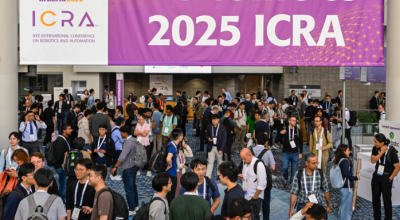
At many organizations, junior employees are expected to observe, learn and follow, but rarely given the opportunity to lead and drive innovation.
The Georgia Tech Research Institute (GTRI) is reversing that trend through its Hives Early Career Independent Research and Development (IRAD) Program. Funded through GTRI’s IRAD program, Hives equips researchers who are in their first six years of employment to lead projects focused on emerging technologies and security topics that have a national and global impact. Tenure-track assistant professors at the Georgia Institute of Technology (Georgia Tech) with less than six years of employment are also eligible to participate.
“Early-stage researchers are GTRI’s future, and I think it’s important to encourage them to think beyond today’s security threats and anticipate what’s ahead,” said Ben Riley, a GTRI principal research associate who is the program’s founder and lead coordinator.
Riley joined GTRI in 2015 after a 30-year career in the U.S. Navy and holding senior leadership roles in the U.S. Department of Defense. He originally joined GTRI in 1998 after retiring from the Navy, left in 2002, and returned in 2015.
He founded the Hives program in 2015 as a way for junior researchers to address national security challenges that don’t yet have official requests or guidelines.
Interested participants who meet the employment requirements must first develop an original idea and submit a proposal before being accepted into the program.
Riley said strong proposals anticipate future technological and geopolitical threats, such as drones, AI applications and disinformation warfare, and develop innovative solutions to address them. The ultimate goal is for projects to be adopted by the Department of Defense or another government sponsor.
Riley encourages interested participants to be creative and share their ideas with him, adding with a smile: “A couple of past participants have told me that when people have a crazy idea, they come to me because they know I’ll listen to anything.”
First-year participants receive $25,000 to develop their idea. Some of the most promising projects receive up to $40,000 to continue into the second year.
“The first year is what I call ‘starting an idea’,” said Riley. “It’s a lot of literature review, exploring technologies, assessing feasibility, and building a plan based on your perspective. You might also begin some early fabrication or software development.”
The second year is more about bringing that idea to life.
“It’s about turning whatever you have envisioned in year one into something tangible you can see, touch or put on the table,” Riley said.
Participants are encouraged to collaborate with other Hives members, GTRI laboratories and Georgia Tech faculty members as they develop their idea.
GTRI Principal Research Engineer Christopher R. Valenta participated in Hives in 2015 during its inaugural year. Valenta began working at GTRI in 2008 as a graduate research assistant while earning his PhD in electrical and computer engineering at Georgia Tech. He graduated in 2014.
Valenta is currently an associate division chief in GTRI’s Electro-Optical Systems Laboratory (EOSL) and an adjunct professor in Georgia Tech’s School of Electrical and Computer Engineering. He has expertise in optics, electromagnetics, and signal progressing – applying these skillsets to optical and RF remote sensing and communications, including LiDAR.
Valenta’s Hives project explored integrating smaller, more rugged optical detectors known as silicon photomultipliers (SiPMs) into airborne LiDAR systems to map underwater terrain – an advancement with important national security implications.
Their compact design made it possible to mount the system on drones and deploy it more frequently, increasing flexibility and operational costs. By enhancing the ability to gather high-resolution underwater data from the air, this innovation strengthens national security efforts, including coastal mapping and maritime security.
It became the first known system of its kind and was incorporated into a major sponsored program.
Beyond the technical expertise he gleaned, Valenta said Hives gave him his first chance to fully lead a project, which laid the groundwork for leading larger initiatives in the future.
“A lot of engineers tend to just focus on the technical side of a project, but Hives also teaches you how to manage a budget, communicate your vision for your project, and lead a team,” Valenta said. “Hives gave me the first opportunity to do those things, so when I applied for bigger, more complex programs, I had some foundation to build off of.”
Lily Huff, a GTRI research engineer and current Hives participant, agreed.
“The Hives program is one of the most applicable early career development programs I’ve participated in,” Huff said. “It has helped me learn how to manage a budget, lead a team and understand my own mentorship style in a low-pressure environment that has made stepping into larger projects feel less intimidating.”
Huff began working at GTRI as a co-op student in 2019 while earning her bachelor’s degree in mechanical engineering at Georgia Tech, graduating in 2021. She joined full-time in 2022 and now works in GTRI’s Aerospace, Transportation & Advanced Systems Laboratory (ATAS), where she specializes in flight test engineering.
For her Hives project, Huff is working with the Army’s Third Infantry Division (3ID) to develop an improved mobile manufacturing space – similar to a makerspace, but designed for field use.
Mobile manufacturing spaces could enable real-time problem-solving and innovation on the battlefield, such as repairing or replacing broken equipment by 3D printing or machining parts on site, or customizing gear for local environments by adapting tools and attachments to better suit weather or terrain.
While still in development, Huff’s research is already informing how 3ID’s current systems are deployed and helping shape improvements for future use.
“The project needs more time and funding, but it’s helping inform how systems that are currently being deployed could be improved,” she said.
Even though many Hives projects have been successful, Riley noted that success isn’t the only measure of value.
“Even if a project fails, a big question for me is, what did the participants learn?” he said.
GTRI’s IRAD Program funds discretionary research across the Georgia Tech enterprise that addresses some of the most pressing challenges in national security, economic development, and the overall human condition. These projects extend GTRI’s research base, sustain capability in critical research areas, foster exploration and innovation, and accelerate entry into emerging areas of interest to GTRI and our sponsors.
Writer: Anna Akins
Photos: Sean McNeil
GTRI Communications
Georgia Tech Research Institute
Atlanta, Georgia
The Georgia Tech Research Institute (GTRI) is the nonprofit, applied research division of the Georgia Institute of Technology (Georgia Tech). Founded in 1934 as the Engineering Experiment Station, GTRI has grown to more than 3,000 employees, supporting eight laboratories in over 20 locations around the country and performing more than $919 million of problem-solving research annually for government and industry. GTRI's renowned researchers combine science, engineering, economics, policy, and technical expertise to solve complex problems for the U.S. federal government, state, and industry.



